-

新人教版高中英语必修3Unit 5 The Value of Money- Discovering Useful Structure教学设计
Step 3 Meaning1. 过去将来时表示从过去某一时间来看将要发生的动作或存在的状态, 常用在宾语从句中。一般由“would/should +动词原形”构成。She hoped that they would meet again someday. 她希望将来有一天他们能再见面。2. was/were going to+动词原形: 表示过去将要发生或很有可能发生的动作, 常用于口语中, 表示预言、意图或者打算等。He was going to start work the following week. 他打算下星期开始工作。3. was/were about to do: 常用来表示即将发生的动作, “刚要/正要做……”。注意该结构不与任何时间状语连用。I felt that something terrible was about to happen. 我感到某种可怕的事情即将发生。4.was/were to do: 表示“曾计划做某事”, 如果表示“本来计划做某事, 动作没实现”, 则需用 “was/were to have done”。She said she was to have told me about the accident. 她说她本来想告诉我关于事故的事。5.Start, go, come, leave, see, meet等动词的过去进行时: 表示就过去某一时刻而言即将发生的动作。She was coming later. 她随后就来。I had just put on my overcoat and was leaving to visit a friend of mine. 我刚穿上外套要去看我的一个朋友。

新人教版高中英语必修3Unit 5 The Value of Money-Listening &Speaking&Talking教学设计
4. A:We’d like to have someone to say a word at the beginning to welcome the group.B:↙Who?A:We thought that you or Dr.Johnson might do it.B用降调说Who,其意思是问,对方想让谁在开场时致欢迎词。Step 6 Pronunciation---Practice1. Listen to the short conversation and mark the intonation with ↗, ↙ or ↙, ↗. Then discuss with a partner what they intend to convey by using different intonation.Owner: You know what ?↗ It’s a million-pound bank note↙.Waiter 1: Really ?↗(question)Waiter 2: Really !↙(unbelievable and surprised)Waiter 3: Really ?!↙↗(first question then surprised)2. Listen to the conversations. Underline the parts that are stressed and mark the intonation. Then talk about the implied meanings of the responses with different intonations. Listen again and repeat.1) Henry: It’s a nice suit.Owner: Oh, it’s perfect!↙(The intonation means it is very suitable for Henry.)2) Henry: Well, that’s very kind of you.Owner: Kind, sir ?↗(what you said is not right) No, it’s kind of you. You must come whenever you want and have whatever you like. Just having you sit here is a great honour !!↙(welcome you to come again)3)Henry:Well, to be honest, I have none. Oliver:(happily) What luck!(excited) Brother↗, what luck!↙(It means “Didn’t you hear it?”)Henry: Well, it may seem lucky to you but not to me!↗(angry) If this is your idea of some kind of joke, I don’t think it’s very funny. Now if you’ll excuse me, I ought to be on my way.↙(If so, I would leave.)Roderick: Please don’t go↙...(hope Henry can wait for a moment)Part B Viewing and Talking---Describe people’s changing attitudes in a film clipStep 1 Before-listening---Tell the filmYou are going to watch part of the film The Million Pound Bank Note. Look at these photos and guess what happens in the film.

新人教版高中英语必修3Unit 5 The Value of Money-Listening &Speaking教学设计
Step 4: Listen again and decide if the following statements are true (T) or false (F).1 It was the first time Chen Liyan's story was reported. T口 F口2 Chen found 10,000 yuan in a small plastic bag in Taiyuan railway station口 F口3 Wang Zheng apologized to Chen because he couldn't offer her more money. T口 F口4 Chen took out a large loan to cure her daughter, T口 F口5 Wang set up a fundraising website for Chen's daughter after Chen told him about her situation. T口 F口Step 5:After listening, discuss the questions.1 What kind of person do you think Chen Liyan is?Chen Liyan is generous and honest because she returned a large sum of money to the owner.2 Did Chen return the money because she didn't need it?No. She returned the money because it was the right thing to do. Evidence for this is that she refused to accept the reward money because she felt that it had not been earned. 3 Is it common for people to do what Chen did?It depends on the culture. In some countries it is quite common to return money that has been found. In other countries, people believe "Finders are keepers!" 4 How did Wang Zheng feel about the return of his money?He must have been very happy and relieved to have gotten his money back. We know this because he thanked Chen repeatedly and even offered her a reward.5 Why did Ma Dongbao tell Wang about Chen's family?He must have had great sympathy for Chen and her daughter and wanted to help them.'We know this because he arranged help for them. 6 How did the news reporter feel about Chen's actions?The news reporter felt that it showed that money wasn't the most important thing in life. We know this because the reporter told us that this is what Chen believes. and then said, “that's a great attitude to take."

新人教版高中英语必修3Unit 3 Diverse Cultures-Reading for Writing教学设计
The topic of this part is “Describe a place with distinctive cultural identity”.This section focuses on Chinese culture by introducing Chinatown, whose purpose is to show the relationship between the Chinese culture and American culture. The Chinese culture in Chinatown is an important part of American culture. Chinatown is an important window of spreading Chinese culture and the spirit homeland of oversea Chinese, where foreigners can experience Chinese culture by themselves.Concretely, the title is “Welcome to Chinatown!”, from which we can know that the article aims at introducing Chinatown. The author used the “Introduction--Body Paragraph--Conclusion” to describe the people, language, architecture, business, famous food and drinks and people’s activities, which can be a centre for Chinese culture and shows its unique charm.1. Read quickly to get main idea; read carefully to get the detailed information.2. Learn the characteristics of writing and language.3. Learn to introduce your own town according to the text.4. Learn to correct others’ writing.1. Learn the characteristics of writing and language.2. Learn to introduce your own town according to the text.Step 1 Lead in ---Small talkIn the reading part, we mentioned the Chinatown of San Francisco. How much do you know about Chinatown of San Francisco ?Chinatown is a main living place for Chinese immigrants, where you can see many Chinese-style buildings, costumes, operas, restaurants, music and even hear Chinese.Step 2 Before reading ---Predict the contentWhat is the writer’s purpose of writing this text ? How do you know ?From the title(Welcome to Chinatown) and some key words from the text(tourist, visit, visitors, experience), we can know the purpose of the text is to introduce Chinatown and show the relationship between Chinese culture and American culture.

新人教版高中英语必修3Unit 3 Diverse Cultures-Listening &Speaking&Talking教学设计
1. In Picture 1 and Picture 2, where do you think they are from? How do you know?From their wearings, we can know they are from ethnic minority of China--- Miao and Dong.Picture 1, they are playing their traditional instrument lusheng in their traditional costumes.Picture 2. the girls are Miao because they wear their traditional costumes and silver accessory.2. In Picture 3, can you find which village it is? What time is it in the picture?It is Dong village. It is at night. Step 2 While-listeningJustin met a new friend while traveling in Guizhou. Listen to their conversation and complete the summaries below.Part 1Justin and Wu Yue watched some Miao people play the lusheng. The instrument has a history of over 3,000 years and it is even mentioned in the oldest collection of Chinese poetry. Then they watched the lusheng dance. Justin wanted to buy some hand-made silver/traditional accessories as souvenirs. He was told that the price will depend on the percentage of silver. Part 2They will go to a pretty Dong minority village called Zhaoxing. they will see the drum towers and the wind and rain bridges. They may also see a performance of the Grand Song of the Dong people.Step 3 Post-listening---TalkingWork in groups. Imagine Justin is telling some friends about his trip to Guizhou. One of you is Justin and the rest of you are his friends. Ask Justin questions about his trip and experience. The following expressions may help you.

新人教版高中英语必修3Unit 4 Space Exploration-Discovering Useful Structure教学设计
The theme of the section is “Describe space facts and efforts to explore space”. Infinitives are one of non-finite verbs, as the subjects, objects, predicative, attributes and adverbials. This unit is about space exploration, which is a significant scientific activity, so every scientific activity has strong planning. Therefore, using the infinitives to show its purpose, explanations or restrictions is the best choice.1. Learn the structure, functions and features of infinitives.2. Learn to summarize some rules about infinitives to show purpose and modify.3. Learn to use infinitives in oral and writing English. 1. Learn the structure, functions and features of infinitives.2. Learn to summarize some rules about infinitives to show purpose and modify.3. Learn to use use infinitives in oral and writing English.Step 1 Lead in---Pair workLook at the following sentences and focus on the italicized infinitives. In pairs, discuss their functions. 1. I trained for a long time to fly airplanes as a fighter pilot..(作目的状语)2. As we all know, an astronaut needs to be healthy and calm in order to work in space..(作目的状语)3. First of all, you must be intelligent enough to get a related college degree..(作目的状语)4. Some scientist were determined to help humans realise their dream to explore space..(作定语)5. On 12 April 1961, Yuri Gagarin became the first person in the world to go into space..(作定语)Summary:1. 不定式的结构:to+do原形。2. 分析上面的句子,我们知道在描述太空探索时,动词不定式不仅可以用来表目的,还可以用来作定语,表修饰。

新人教版高中英语必修3Unit 4 Space Exploration-Listening&Speaking&Talking教学设计二
The themes of this part are “Talk about how to become an astronaut” and “Talk about life in space”. As Neil Armstrong said “Mystery creates wonder and wonder is the basis of man’s desire to understand. Space is difficult for human to reach, therefore, humans are full of wonders about it. However, if wanting to achieve the dream of reaching the Moon, some of our human should work hard to be an astronaut at first. Part A(Talk about how to become an astronaut) is a radio interview in a radio studio, where the host asked the Chinese astronauts about his story how to become an astronaut. Yang Liwei told his dreamed to be an astronaut since childhood. Then he worked hard to get into college at 22. The next 10 years, he gradually became an experienced pilot. At the same time, to be an astronaut, he had to study hard English, science and astronomy and trained hard to keep in good physical and mental health and to practise using space equipment. Part B (Talk about life in space) is also an interview with the astronaut Brown, who is back on the earth. The host Max asked about his space life, such as his emotion about going back the earth, the eating, shower, brushing, hobbies and his work. Part A and Part B are interviews. So expressing curiosity about the guests’ past life is a communicative skill, which students should be guided to learn.1. Students can get detailed information about how Yang Liwei became an astronaut and Max’s space life.2. Students learn to proper listening strategy to get detailed information---listening for numbers and taking notes.3. Students can learn related sentences or phrases to express their curiosity like “ I wish to know...” “I’d love to know...”4. Students can learn more about the space and astronauts, even be interested in working hard to be an astronaut

新人教版高中英语必修3Unit 4 Space Exploration-Reading for Writing教学设计二
⑦在我看来, 探索太空是值得的。As far as I am concerned, it is worthwhile to explore the space.Step 10 Writing---draftRecently, students in our class have had heated a discussion on whether space is worth exploring. Students hold different ideas about it.30% of us think space exploration is not worthwhile. They think space is too far away from us and our daily life and is a waste of money. And the money spent on space exploration can be used to solve the earth’s problems such as starvation and pollution.On the other hand,70% think space is worth exploring because we have benefited a lot from it,such as using satellites for communication and weather forecast. What’s more,with further space research,we may solve the population problem by moving to other planets one day. Also,space research will enable us to find new sources to solve the problem of energy shortages on the earth.As far as I am concerned, it is worthwhile to explore the space. Not only can it promote the development of society but also enrich our life. Step 11 Pair workExchange drafts with a partner. Use this checklist to help your partner revise his/her draft.1.Does the writer explain why he/she changed/wanted to change?2.Does the writer tell how the changes have improved or will improve his/her life?3.Is the text well-organised?4.Does the writer use words and expressions to show similarities and differences?5.Are there any grammar or spelling errors?6.Does the writer use correct punctuation?

新人教版高中英语必修3Unit 5 The Value of Money-Discovering Useful Structures导学案
4.They were going to find someone to take part in their bet when they saw Henry walking on the street outside.[归纳]1.过去将来时的基本构成和用法过去将来时由“would+动词原形”构成,主要表示从过去某一时间来看将要发生的动作(尤其用于宾语从句中),还可以表示过去的动作习惯或倾向。Jeff knew he would be tired the next day.He promised that he would not open the letter until 2 o'clock.She said that she wouldn't do that again.2.表示过去将来时的其他表达法(1)was/were going to+动词原形:该结构有两个主要用法,一是表示过去的打算,二是表示在过去看来有迹象表明将要发生某事。I thought it was going to rain.(2)was/were to+动词原形:主要表示过去按计划或安排要做的事情。She said she was to get married next month.(3)was/were about to+动词原形:表示在过去看来即将要发生的动作,由于本身已含有“即将”的意味,所以不再与表示具体的将来时间状语连用。I was about to go to bed when the phone rang.(4)was/were+现在分词:表示在过去看来即将发生的动作,通常可用于该结构中的动词是come,go,leave,arrive,begin,start,stop,close,open,die,join,borrow,buy等瞬间动词。Jack said he was leaving tomorrow.
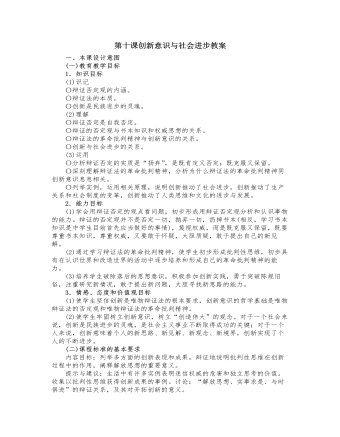
人教版高中政治必修4第十课创新意识与社会进步教案
2.辩证的否定(1)辩证的否定是事物的自我否定。事物内部存在着肯定方面和否定方面,它们既对立又统一。最初,肯定方面处于支配地位,否定方面处于被支配地位。在这种情况下,事物就被肯定着。但是,在矛盾双方的斗争中,否定方面总会由弱变强。一旦否定方面由被支配地位上升为支配地位,事物就转化到了自己的对立面,实现了对事物的否定。事物最终之所以被否定,根源在于事物的内部,是事物内部的否定因素战胜了肯定因素。因此,事物的否定是自我否定。(2)辩证的否定是事物发展的环节和联系的环节。所谓发展,是指新事物的产生和旧事物的灭亡。而实现这一过程必须要对旧事物进行否定,否定实现了事物由旧质向新质的飞跃。新事物在否定旧事物时,并不是把旧事物全盘抛弃,一笔勾销。旧事物是新事物的母体,新事物从旧事物那里脱胎而来,新事物是在批判地继承旧事物中的一切积极的有生命力的因素的基础上发展起来的。这样,在新旧事物之间就存在着必然的联系。
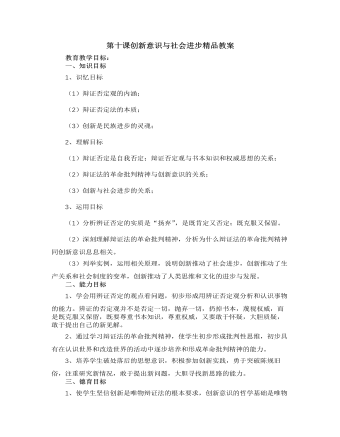
人教版高中政治必修4第十课创新意识与社会进步精品教案
在数学上,0这个数是解决记数和进位问题而引进的概念,由于它不能表示实在的东西,很长时间人们不把它看作是一个数。认为0是无,是对有的否定。从唯物辩证法的观点看,这种否定不是形而上学的简单否定,而是具有丰富内容的辨证否定。辨证的否定是发展的环节。0是从无到有的必经之路,是连接无和有的桥梁。0又是正数和负数之间的界限,它既否定了任何正数,也否定了任何负数,是唯一的中性数。但它又是联结正数和负数的中间环节。没有0,负数就过渡不到正数去,正数也休想发展到负数来。数学中的0是对任何定量的否定。如果没有这一否定,任何量的发展都无从谈起。这个否定不是一笔勾销,而是扬弃。因为它克服了任何定量的有限性,成为其发展的环节。在现实生活中,0作为辨证的否定,也体现出联系和发展的性质。如0度不是没有温度,而是非常确定的温度。
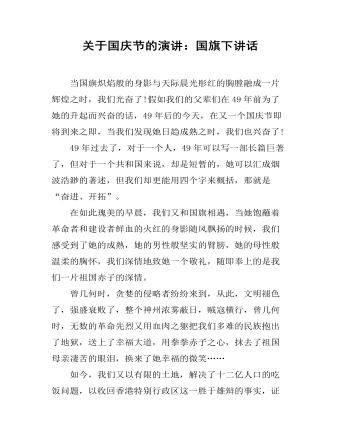
关于国庆节的演讲:国旗下讲话
当国旗炽焰般的身影与天际晨光彤红的胸膛融成一片辉煌之时,我们光奋了!假如我们的父辈们在49年前为了她的升起而兴奋的话,49年后的今天,在又一个国庆节即将到来之即,当我们发现她日趋成熟之时,我们也兴奋了!49年过去了,对于一个人,49年可以写一部长篇巨著了,但对于一个共和国来说,却是短暂的,她可以汇成烟波浩渺的著述,但我们却更能用四个字来概括,那就是“奋进、开拓”。在如此瑰美的早晨,我们又和国旗相遇,当她饱蘸着革命者和建设者鲜血的火红的身影随风飘扬的时候,我们感受到了她的成熟,她的男性般坚实的臂膀,她的母性般温柔的胸怀,我们深情地致她一个敬礼,随即奉上的是我们一片祖国赤子的深情。曾几何时,贪婪的侵略者纷纷来到,从此,文明褪色了,强盛衰败了,整个神州浓雾蔽日,贼寇横行,曾几何时,无数的革命先烈又用血肉之躯把我们多难的民族抱出了地狱,送上了幸福大道,用拳拳赤子之心,抹去了祖国母亲凄苦的眼泪,换来了她幸福的微笑……
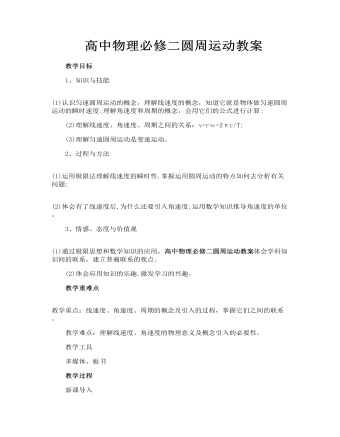
高中物理必修1教案高中物理必修二圆周运动教案
一、描述圆周运动的物理量 探究交流 打篮球的同学可能玩过转篮球,让篮球在指尖旋转,展示自己的球技,如图5-4-1所示.若篮球正绕指尖所在的竖直轴旋转,那么篮球上不同高度的各点的角速度相同吗?线速度相同吗? 【提示】 篮球上各点的角速度是相同的.但由于不同高度的各点转动时的圆心、半径不同,由v=ωr可知不同高度的各点的线速度不同.

人教版新课标高中地理必修2第二章第一节城市内部空间结构教案
为城市居民提供休养生息的场所,是城市最基本的功能区.城市中最为广泛的土地利用方式就是住宅用地.一般住宅区占据城市空间的40%—60%。(阅读图2.3)请同学讲解高级住宅区与低级住宅区的差别(学生答)(教师总结)(教师讲解)另外还有行政区、文化区等。而在中小城市,这些部门占地面积很小,或者布局分散,形成不了相应的功能 区。(教师提问)我们把城市功能区分了好几种,比如说住宅区,是不是土地都是被居住地占据呢?是不是就没有其他的功能了呢?(学生回答)不是(教师总结)不是的。我们说的住宅区只是在占地面积上,它是占绝大多数,但还是有土地是被其它功能占据的,比如说住宅区里的商店、绿化等也要占据一定的土地, 只是占的比例比较小而已。下面请看书上的活动题。
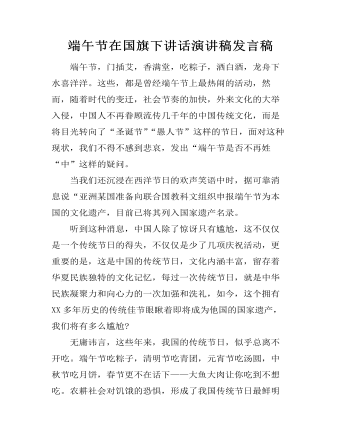
端午节在国旗下讲话演讲稿发言稿
端午节,门插艾,香满堂,吃粽子,洒白酒,龙舟下水喜洋洋。这些,都是曾经端午节上最热闹的活动,然而,随着时代的变迁,社会节奏的加快,外来文化的大举入侵,中国人不再眷顾流传几千年的中国传统文化,而是将目光转向了“圣诞节”“愚人节”这样的节日,面对这种现状,我们不得不感到悲哀,发出“端午节是否不再姓“中”这样的疑问。当我们还沉浸在西洋节日的欢声笑语中时,据可靠消息说“亚洲某国准备向联合国教科文组织申报端午节为本国的文化遗产,目前已将其列入国家遗产名录。听到这种消息,中国人除了惊讶只有尴尬,这不仅仅是一个传统节日的得失,不仅仅是少了几项庆祝活动,更重要的是,这是中国的传统节日,文化内涵丰富,留存着华夏民族独特的文化记忆,每过一次传统节日,就是中华民族凝聚力和向心力的一次加强和洗礼,如今,这个拥有XX多年历史的传统佳节眼瞅着即将成为他国的国家遗产,我们将有多么尴尬?
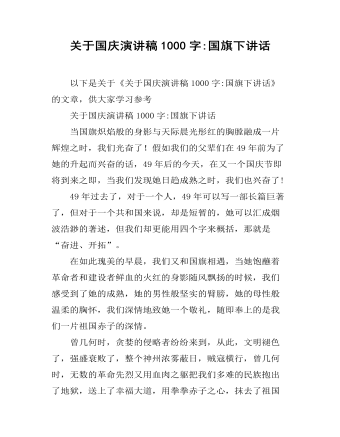
关于国庆演讲稿1000字:国旗下讲话
以下是关于《关于国庆演讲稿1000字:国旗下讲话》的文章,供大家学习参考关于国庆演讲稿1000字:国旗下讲话当国旗炽焰般的身影与天际晨光彤红的胸膛融成一片辉煌之时,我们光奋了!假如我们的父辈们在49年前为了她的升起而兴奋的话,49年后的今天,在又一个国庆节即将到来之即,当我们发现她日趋成熟之时,我们也兴奋了!49年过去了,对于一个人,49年可以写一部长篇巨著了,但对于一个共和国来说,却是短暂的,她可以汇成烟波浩渺的著述,但我们却更能用四个字来概括,那就是“奋进、开拓”。在如此瑰美的早晨,我们又和国旗相遇,当她饱蘸着革命者和建设者鲜血的火红的身影随风飘扬的时候,我们感受到了她的成熟,她的男性般坚实的臂膀,她的母性般温柔的胸怀,我们深情地致她一个敬礼,随即奉上的是我们一片祖国赤子的深情。曾几何时,贪婪的侵略者纷纷来到,从此,文明褪色了,强盛衰败了,整个神州浓雾蔽日,贼寇横行,曾几何时,无数的革命先烈又用血肉之躯把我们多难的民族抱出了地狱,送上了幸福大道,用拳拳赤子之心,抹去了祖国母亲凄苦的眼泪,换来了她幸福的微笑……
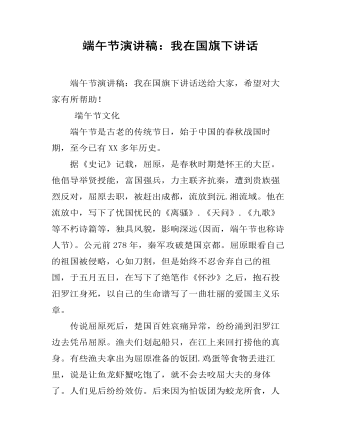
端午节演讲稿:我在国旗下讲话
端午节演讲稿:我在国旗下讲话送给大家,希望对大家有所帮助!端午节文化端午节是古老的传统节日,始于中国的春秋战国时期,至今已有XX多年历史。据《史记》记载,屈原,是春秋时期楚怀王的大臣。他倡导举贤授能,富国强兵,力主联齐抗秦,遭到贵族强烈反对,屈原去职,被赶出成都,流放到沅.湘流域。他在流放中,写下了忧国忧民的《离骚》.《天问》.《九歌》等不朽诗篇等,独具风貌,影响深远(因而,端午节也称诗人节)。公元前278年,秦军攻破楚国京都。屈原眼看自己的祖国被侵略,心如刀割,但是始终不忍舍弃自己的祖国,于五月五日,在写下了绝笔作《怀沙》之后,抱石投汨罗江身死,以自己的生命谱写了一曲壮丽的爱国主义乐章。传说屈原死后,楚国百姓哀痛异常,纷纷涌到汨罗江边去凭吊屈原。渔夫们划起船只,在江上来回打捞他的真身。有些渔夫拿出为屈原准备的饭团.鸡蛋等食物丢进江里,说是让鱼龙虾蟹吃饱了,就不会去咬屈大夫的身体了。人们见后纷纷效仿。
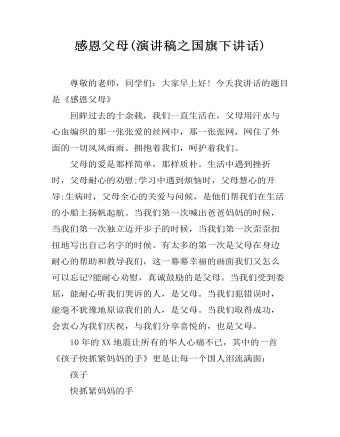
感恩父母(演讲稿之国旗下讲话)
尊敬的老师,同学们:大家早上好! 今天我讲话的题目是《感恩父母》回眸过去的十余载,我们一直生活在,父母用汗水与心血编织的那一张张爱的丝网中,那一张张网,网住了外面的一切风风雨雨。拥抱着我们,呵护着我们。父母的爱是那样简单,那样质朴。生活中遇到挫折时,父母耐心的劝慰;学习中遇到烦恼时,父母慧心的开导;生病时,父母全心的关爱与问候,是他们帮我们在生活的小船上扬帆起航。当我们第一次喊出爸爸妈妈的时候,当我们第一次独立迈开步子的时候,当我们第一次歪歪扭扭地写出自己名字的时候。有太多的第一次是父母在身边耐心的帮助和教导我们,这一幕幕幸福的画面我们又怎么可以忘记?能耐心劝慰,真诚鼓励的是父母。当我们受到委屈,能耐心听我们哭诉的人,是父母。当我们犯错误时,能毫不犹豫地原谅我们的人,是父母。当我们取得成功,会衷心为我们庆祝,与我们分享喜悦的,也是父母。10年的XX地震让所有的华人心痛不已,其中的一首《孩子快抓紧妈妈的手》更是让每一个国人泪流满面:孩子快抓紧妈妈的手
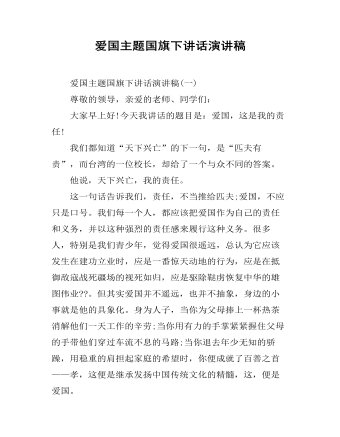
爱国主题国旗下讲话演讲稿
爱国主题国旗下讲话演讲稿(一)尊敬的领导,亲爱的老师、同学们:大家早上好!今天我讲话的题目是:爱国,这是我的责任!我们都知道“天下兴亡”的下一句,是“匹夫有责”,而台湾的一位校长,却给了一个与众不同的答案。他说,天下兴亡,我的责任。这一句话告诉我们,责任,不当推给匹夫;爱国,不应只是口号。我们每一个人,都应该把爱国作为自己的责任和义务,并以这种强烈的责任感来履行这种义务。很多人,特别是我们青少年,觉得爱国很遥远,总认为它应该发生在建功立业时,应是一番惊天动地的行为,应是在抵御敌寇战死疆场的视死如归,应是驱除鞑虏恢复中华的雄图伟业??。但其实爱国并不遥远,也并不抽象,身边的小事就是他的具象化。身为人子,当你为父母捧上一杯热茶消解他们一天工作的辛劳;当你用有力的手掌紧紧握住父母的手带他们穿过车流不息的马路;当你退去年少无知的骄躁,用稳重的肩担起家庭的希望时,你便成就了百善之首——孝,这便是继承发扬中国传统文化的精髓,这,便是爱国。
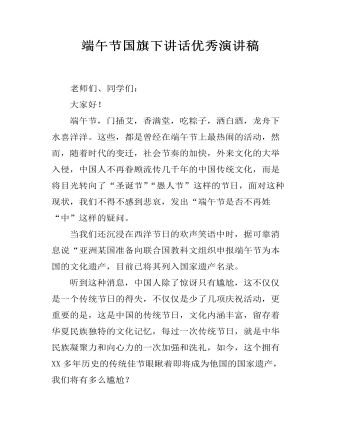
端午节国旗下讲话优秀演讲稿
老师们、同学们:大家好!端午节,门插艾,香满堂,吃粽子,洒白酒,龙舟下水喜洋洋。这些,都是曾经在端午节上最热闹的活动,然而,随着时代的变迁,社会节奏的加快,外来文化的大举入侵,中国人不再眷顾流传几千年的中国传统文化,而是将目光转向了“圣诞节”“愚人节”这样的节日,面对这种现状,我们不得不感到悲哀,发出“端午节是否不再姓“中”这样的疑问。当我们还沉浸在西洋节日的欢声笑语中时,据可靠消息说“亚洲某国准备向联合国教科文组织申报端午节为本国的文化遗产,目前已将其列入国家遗产名录。听到这种消息,中国人除了惊讶只有尴尬,这不仅仅是一个传统节日的得失,不仅仅是少了几项庆祝活动,更重要的是,这是中国的传统节日,文化内涵丰富,留存着华夏民族独特的文化记忆,每过一次传统节日,就是中华民族凝聚力和向心力的一次加强和洗礼,如今,这个拥有XX多年历史的传统佳节眼瞅着即将成为他国的国家遗产,我们将有多么尴尬?